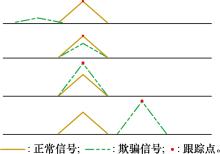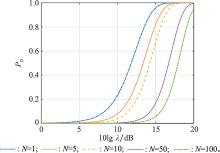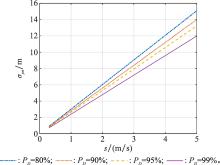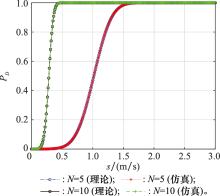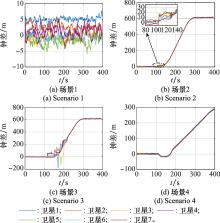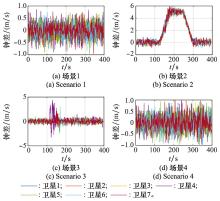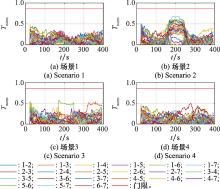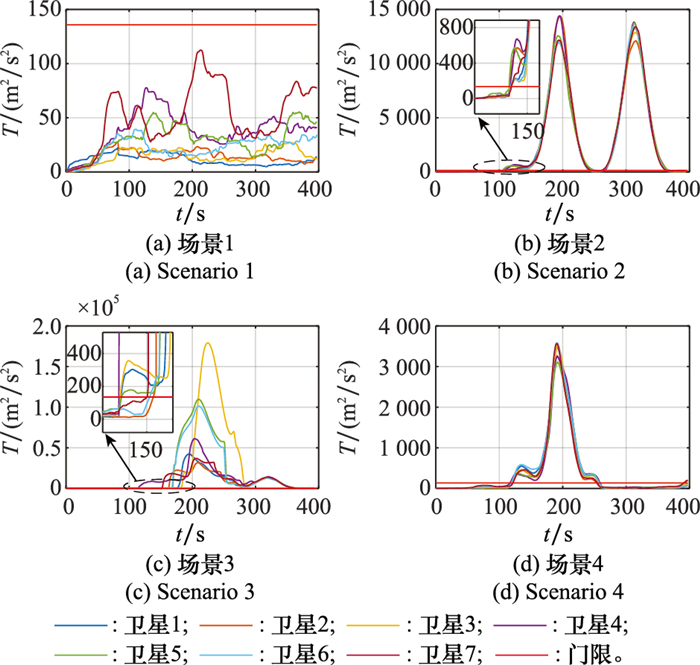Systems Engineering and Electronics ›› 2022, Vol. 44 ›› Issue (3): 948-955.doi: 10.12305/j.issn.1001-506X.2022.03.27
• Guidance, Navigation and Control • Previous Articles Next Articles
GNSS time spoofing detection and discrimination based on clock bias hypothesis test
Dong FU, Jing PENG*, Ming MA, Feiqiang CHEN, Gang OU
- College of Electronic Science and Technology, National University of Defense Technology, Changsha 410073, China
-
Received:2021-06-01Online:2022-03-01Published:2022-03-10 -
Contact:Jing PENG
CLC Number:
Cite this article
Dong FU, Jing PENG, Ming MA, Feiqiang CHEN, Gang OU. GNSS time spoofing detection and discrimination based on clock bias hypothesis test[J]. Systems Engineering and Electronics, 2022, 44(3): 948-955.
share this article
| 1 | 吴海涛, 李变, 武建锋. 北斗授时技术及其应用[M]. 北京: 电子工业出版社, 2016. |
| WU H T , LI B , WU J F . Beidou timing technology and its application[M]. Beijing: Publishing House of Electronics Industry, 2016. | |
| 2 | HUMPHREYS T E, LEDVINA B M, PSIAKI M L, et al. Assessing the spoofing threat: development of a portable GPS civilian spoofer[C]//Proc. of the International Technical Mee-ting of the Satellite Division of the Institute of Navigation, 2008. |
| 3 | SCOTT L. Anti-spoofing and authenticated signal architectures for civil navigation systems[C]//Proc. of the 16th International Technical Meeting of the Satellite Division of the Institute of Navigation, 2003. |
| 4 | 黄龙, 唐小妹, 王飞雪. 卫星导航接收机抗欺骗干扰方法研究[J]. 武汉大学学报(信息科学版), 2011, 36 (11): 1344- 1347. |
| HUANG L , TANG X M , WANG F X . Anti-spoofing techniques for GNSS receiver[J]. Geomatics and Information Science of Wuhan University, 2011, 36 (11): 1344- 1347. | |
| 5 |
PSIAKI M L , HUMPHREYS T E . GNSS spoofing and detection[J]. Proceedings of the IEEE, 2016, 104 (6): 1258- 1270.
doi: 10.1109/JPROC.2016.2526658 |
| 6 | DAI X Z , NIE J W , CHEN F Q , et al. Distortionless space-time adaptive processor based on MVDR beamformer for GNSS receiver[J]. IET Radar, Sonar & Navigation, 2017, 11 (10): 1488- 1494. |
| 7 | 陈飞强, 聂俊伟, 苏映雪, 等. 载波相位辅助的卫星导航天线阵抗干扰算法[J]. 国防科技大学学报, 2015, 37 (6): 69- 73. |
| CHEN F Q , NIE J W , SU Y X , et al. Anti-jamming algorithm for GNSS antenna array aided by carrier phase[J]. Journal of National University of Defense Technology, 2015, 37 (6): 69- 73. | |
| 8 | DU L , LI L X , LI Z R , et al. Four-arm spiral antenna fed by tapered transmission line[J]. IEEE Antennas and Wireless Propagation Letters, 2017, 16 (1): 62- 65. |
| 9 | LU Z K , NIE J W , CHEN F Q , et al. Adaptive time taps of STAP under channel mismatch for GNSS antenna arrays[J]. IEEE Trans.on Instrumentation and Measurement, 2017, 16 (11): 2813- 2824. |
| 10 |
黄龙, 龚航, 朱祥维, 等. 针对GNSS授时接收机的转发式欺骗干扰技术研究[J]. 国防科技大学学报, 2013, 35 (4): 93- 96.
doi: 10.3969/j.issn.1001-2486.2013.04.017 |
|
HUANG L , GONG H , ZHU X W , et al. Research of re-radiating spoofing technique to GNSS timing receiver[J]. Journal of National University of Defense Technology, 2013, 35 (4): 93- 96.
doi: 10.3969/j.issn.1001-2486.2013.04.017 |
|
| 11 | 刘洋, 李四海, 付强文, 等. 芯片级原子钟辅助的惯性/卫星组合导航系统欺骗检测方法[J]. 中国惯性技术学报, 2019, 27 (5): 654- 660. |
| LIU Y , LI S H , FU Q W , et al. Chip-scale atomic clock aided INS/GNSS integrated navigation system spoofing detection method[J]. Journal of Chinese Inertial Technology, 2019, 27 (5): 654- 660. | |
| 12 | GAO W Y, LI H, LI J F, et al. GNSS time synchronization attack detection and discrimination based on correlations of calculated clock drift time-differences[C]//Proc. of the 33rd International Technical Meeting of the Satellite Division of The Institute of Navigation, 2020: 3854-3865. |
| 13 | 朱祥维, 伍贻威, 龚航, 等. 复杂干扰环境下的卫星授时接收机加固技术[J]. 国防科技大学学报, 2015, 37 (3): 1- 9. |
| ZHU X W , WU Y W , GONG H , et al. GNSS timing receiver toughen technique in complicated jamming environments[J]. Journal of National University of Defense Technology, 2015, 37 (3): 1- 9. | |
| 14 | LIANG H, MAKELA J J, DOMINGUEZ-GARCIA A D, et al. Reliable GPS-based timing for power systems: a multi-layered multi-receiver architecture[C]//Proc. of the IEEE Power & Energy Conference at Illinois, 2014. |
| 15 | 谢钢. GPS原理与接收机设计[M]. 北京: 电子工业出版社, 2009. |
| XIE G . Principle of GPS and receiver design[M]. Beijing: Publishing House of Electronics Industry, 2009. | |
| 16 | BROWN R G , HWANG P . Introduction to random signals and applied Kalman filtering with Matlab exercises[M]. Hoboken: John Wiley & Sons Incorporated, 1997. |
| 17 | 董绍武. 守时中的若干重要技术问题研究[D]. 西安: 中国科学院国家授时中心, 2007. |
| DONG S W. Study on several important technical issues in time- keeping[D]. Xi'an: National Time Service Center, Chinese Academy of Sciences, 2007. | |
| 18 |
GAO Y , LI H , LU M Q , et al. Intermediate spoofing strategies and countermeasures[J]. Tsinghua Science and Technology, 2013, 18 (6): 599- 605.
doi: 10.1109/TST.2013.6678905 |
| 19 |
IOANNIDES R T , PANY T , GIBBONS G . Known vulnerabilities of global navigation satellite systems, status, and potential mitigation techniques[J]. Proceedings of the IEEE, 2016, 104 (6): 1174- 1194.
doi: 10.1109/JPROC.2016.2535898 |
| 20 |
何亮, 李炜, 郭承军. 生成式欺骗干扰研究[J]. 计算机应用研究, 2016, 33 (8): 2405- 2408.
doi: 10.3969/j.issn.1001-3695.2016.08.036 |
|
HE L , LI W , GUO C J . Study on GPS generated spoofing attacks[J]. Application Research of Computers, 2016, 33 (8): 2405- 2408.
doi: 10.3969/j.issn.1001-3695.2016.08.036 |
|
| 21 | 罗鹏飞, 张文明. 统计信号处理基础[M]. 北京: 电子工业出版社, 2014. |
| LUO P F , ZHANG W M . Fundamentals of statistical signal processing[M]. Beijing: Publishing House of Electronics Industry, 2014. | |
| 22 | CURRAN J T , LACHAPELLE G , MURPHY C C . Digital GNSS PLL design conditioned on thermal and oscillator phase noise[J]. IEEE Trans.on Aerospace & Electronic Systems, 2013, 48 (1): 180- 196. |
| 23 | KAI B , DENNIS A . A software-defined GPS and galileo receiver: single-frequency approach[M]. Boston: Birkhäuser, 2007. |
| 24 | HUMPHREYS T E, BHATTI J A, SHEPARD D P, et al. The texas spoofing test battery: toward a standard for evaluating GPS signal authentication techniques[C]//Proc. of the Phenomena in Ionized Gases, Ⅵ International Conference, 2012. |
| 25 | LEMMENES A, CORBELL P, GUNAWARDENA S. Detailed analysis of the TEXBAT datasets using a high fidelity software GPS receiver[C]//Proc. of the 29th International Technical Meeting of the Satellite Division of the Institute of Navigation, 2016: 3027-3032. |
| [1] | Zukun LU, Haiyu GUO, Jie SONG, Yifan SUN, Baiyu LI. Optimal front-end gain of anti-jamming satellite navigation receiver [J]. Systems Engineering and Electronics, 2022, 44(7): 2270-2275. |
| [2] | Rui LIU, Zhiwei YANG, Qidong CHEN, Guisheng LIAO, Weimin ZHEN. Centroid localization method of GNSS jamming source based on signal propagation correction [J]. Systems Engineering and Electronics, 2021, 43(8): 2083-2089. |
| [3] | Qiuying WANG, Kaiyue LIU, Juan YIN. Research on error estimation of micro-gyroscope and location method based on BPNN for vehicle during GNSS outages [J]. Systems Engineering and Electronics, 2020, 42(5): 1139-1145. |
| [4] | Haiyang WANG, Zhicheng YAO, Zhiliang FAN, Jinying WU, Guangbin LIU. Anti-jamming algorithm for GNSS receivers with array antenna in high speed environment [J]. Systems Engineering and Electronics, 2020, 42(11): 2409-2417. |
| [5] | Dan LIU, Xiaozhou YE, Wei XIAO, Wenxiang LIU, Feixue WANG. Efficient simulation algorithm for the influence of terrain occlusion on the GNSS interference range [J]. Systems Engineering and Electronics, 2020, 42(11): 2418-2425. |
| [6] | Yuqing FAN, Erwei CHENG, Ming WEI, Qinglong ZHANG, Yazhou CHEN. Analysis of damage effect of high-power microwave bomb on GNSS receiver [J]. Systems Engineering and Electronics, 2020, 42(1): 37-44. |
| [7] | WANG Jianing, LIAN Baowang, ZHANG Miaomiao. GNSS signal acquisition method based on ZF frequency error correction [J]. Systems Engineering and Electronics, 2019, 41(4): 701-707. |
| [8] | . Optimization and analysis of GNSS dual frequency sum diff joint tracking algorithm based on CNR model weighting [J]. Systems Engineering and Electronics, 2019, 41(4): 708-715. |
| [9] | GE Baoshuang, ZHANG Hai, JIN Yanqiong. Redundant measurement based method for online mitigation of GNSS multipath errors [J]. Systems Engineering and Electronics, 2019, 41(11): 2581-2587. |
| [10] | LI Wengang, WANG Yiwei, CHEN Rui, LIU Meng. Antimultipath dualestimate loop method for BOC modulated signals [J]. Systems Engineering and Electronics, 2018, 40(5): 1118-1123. |
| [11] | WANG Ershen, ZHANG Qing, QU Pingping, LAN Xiaoyu, PANG Tao, JIANG Yi. GNSS constellation availability evaluation method based on Markov chain [J]. Systems Engineering and Electronics, 2017, 39(4): 814-820. |
| [12] | HE Cheng-yan, GUO Ji, LU Xiao-chun, LU Jun. Generation mechanisms of GNSS navigation signal distortions and influence on ranging performance [J]. Systems Engineering and Electronics, 2015, 37(7): 1611-1620. |
| [13] | HOU Hong-tao1,ZHOU Hong-wei2,LI Qun1,CHANG Qiang1,ZHANG Wang-xun1. The research on jamming attack in receiver network based GNSS [J]. Systems Engineering and Electronics, 2014, 36(6): 1195-1200. |
| [14] | HOU Hong-tao,XIE Fei,ZHANG Wang-xun,WANG Wei-ping,HUANG Cong-shan. Availability analysis for constellation of GNSS based on Markov process [J]. Systems Engineering and Electronics, 2014, 36(4): 685-690. |
| [15] | REN Jia-wei, CHEN Hui-hua, JIA Wei-min, YAO Min-li. Optimum design of code discriminator for GNSS based on multi-correlator structure [J]. Journal of Systems Engineering and Electronics, 2013, 35(6): 1297-1302. |
| Viewed | ||||||
|
Full text |
|
|||||
|
Abstract |
|
|||||
